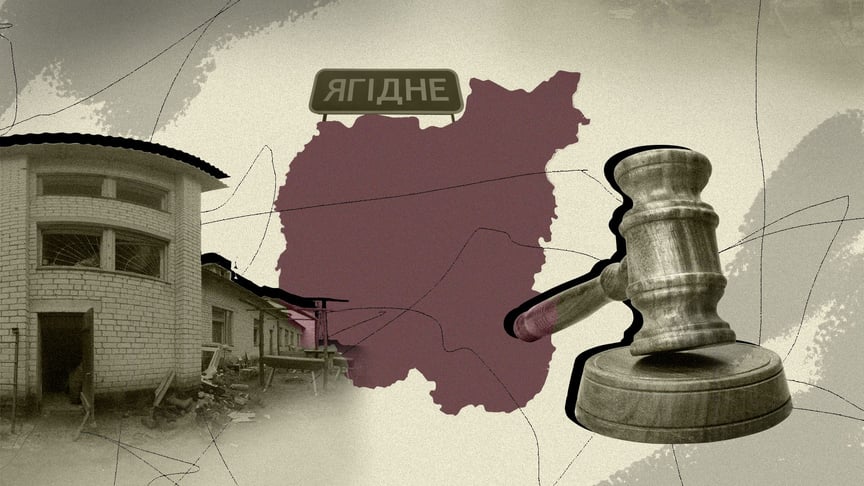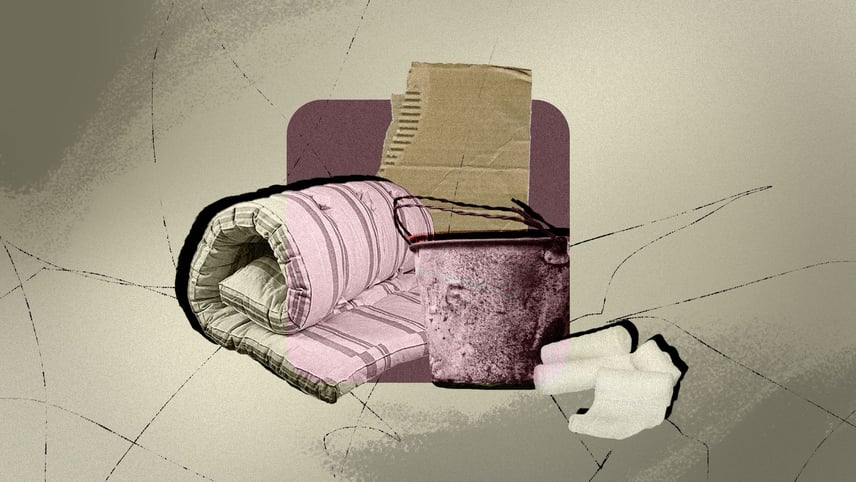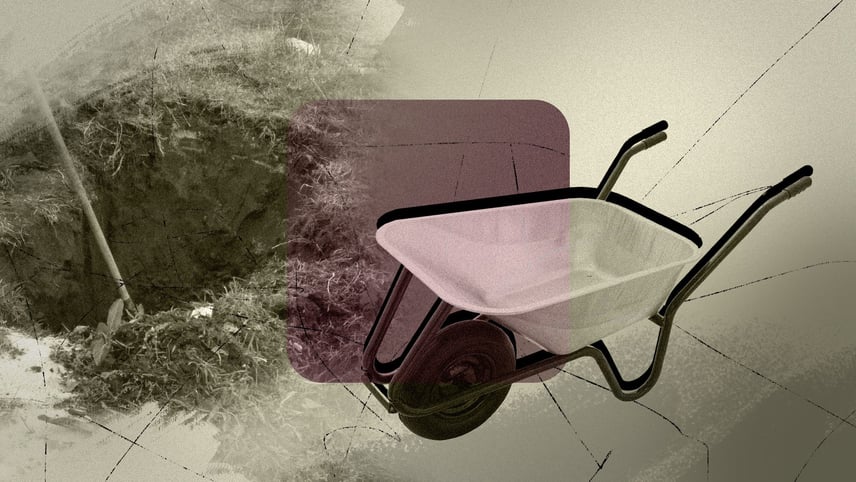26 case volumes and suspects ‘looking the same’. How war crimes were investigated in Yahidne

15 Russian servicemen who were accused of committing war crimes against 368 people in the village of Yahidne, the Chernihiv region, have received their sentences. They were all found guilty of violating the laws and customs of war and sentenced to 12 years in prison.
Having occupied Yahidne in March 2022, the Russians held the villagers in the basement of the local school for 27 days. Ten people died from inhumane conditions there.
The documents in the case include 26 volumes. It was investigated by more than two dozen experts.
hromadske visited the courtroom and talked to the victims, the prosecutor in the case, Serhii Krupko, and the head of the investigation department of the SBU Office in Chernihiv Oblast, Andrii Prosniak. In their words, we recreate the path from the crime itself to the verdict.
Victims' testimonies
During the trial, the Russians' lawyers emphasized that the defendants were following orders from their commanders. The victims emphasized that there are different ways to carry out orders.
Svitlana M.: “My granddaughter was only a month and a half old. The diapers we took from home ran out quickly, the Russians gave us some, but they leaked. The girl had diarrhea, but there was no water. There was no toilet paper, so we tore pages from the school library books.
I had two one-and-a-half liter thermoses — I begged Russians for boiling water to dilute her food formula. In the second thermos, I kept chilled water to give Alisa a drink and wet a piece of clothing to wipe her down.
Alisa was suffocating from the stale air and dust, not even crying out. I said to the Russian commander, Klyon: ‘You also have children, let ours go out more often for fresh air. Or do you want them to die?’ And he said: ‘Whatever’.”
Alina: “Someone managed to take the sanitary pads, so we shared them, tore some diapers and some clothes to shreds, and asked the Russians for pads. They brought us some from humanitarian aid — not even everyone got one or two. It was impossible to wash yourself during your period, as well as on all other days, so we wiped ourselves with wet napkins. We smelled very bad, we were disgusted with ourselves.”
Olha: “People used buckets to go to the toilet, all in front of everyone. The Russians did not allow us to take out even full buckets right away, they could stand there for a day. The stale air, these buckets, unwashed people, the bodies of the dead among us, we were just suffocating.”
Ivan: “The Russians would take the leftovers from their kitchen to the trash, our children would run to those leftovers, and the Russians would take pictures of them and laugh: ‘We came to feed the Ukrainians’.”
Mykhailo: “At first, people ate what they had taken from home. Then we started asking them to let us go to take food. The Russians rarely let us go, only under escort and for a few minutes — what can you take? Then we started asking them for food. They gave us some kind of stew, biscuits, cookies from dry rations.
Once they gave us a box of butter, 360 servings of 10 grams each. We cooked our food outside in pots from the kindergarten kitchen — some soup or porridge. Sometimes we were allowed to cook every day, and sometimes every few days. A portion was the size of a not full 200-gram cup.”
Svitlana S.: “The Russians gave us their pasta, rice, and wheat groats. They didn't want to eat it, because it smelled like diesel fuel, but we had to. We also found some semolina in the kindergarten kitchen and cooked it for the little kids, enough for five meals.
The kindergarten had some meat in the freezer, so we begged the Russians for it. They gave us two shot rabbits and about five chickens — that was all the meat we had.
People asked to go home to milk the cows and bring milk to their children: some were allowed, some were not. And then the Russians shot all the cows, and now there are none in the village.”
Tetiana: “My dad was 90 years old, he had just recovered from Covid-19. My mom was 80, she walked with a cane after a stroke. We took them to that basement in wheelbarrows. We put my father on a tennis table, but there was nowhere to put my mother. We put her on a chair, and she sat and slept on it, curled up. Her legs were swollen so much that the skin was bursting.
If the Russians had at least made some beds or bunks, like in the Nazi concentration camps, so that at least old people could lie down, then maybe my parents would have survived. My father died on March 9, and my mother died on March 17. She was sitting on that chair and died sitting there. We wrapped them in kindergarten blankets — we couldn't wash them, change their clothes, or put them in a coffin. So we put them in the pit in those blankets, in those clothes they wore in the basement. Without coffins.”
Liuba: “Those people who died were all elderly. Most of them were still working in the gardens, tending the cattle before the basement. My mom was not that old, she was 69. At first, her legs gave out, and then she went crazy, delirious, and fainted.
We asked the Russians to let us go home with her, but they only allowed us to take her to the boiler room. We told them that she was dying, and they said: ‘Whatever’.
My mother was in that boiler room for several days. On the evening of March 28, she died, the last of our people. On March 30, the Russians fled the village. She didn't live a day to be rescued.”
Dmytro: “We used to take the dead to the cemetery in wheelbarrows. We would dig a hole and put them in blankets next to each other, two or three people at a time. We didn't sprinkle them too much, because we thought that when our people came, we would have to rebury them.”
Father Dmytro: “I was not able to give a proper funeral service for a single person. It is a great sin not to give the dead a proper funeral. The Russians treated us as masters of the universe, and I have never experienced such contempt as they did in my life.”

Proving that the crime was committed
The Chernihiv Oblast Prosecutor's Office opened criminal proceedings over the crimes in Yahidne in April 2022 based on information from social media. After the village was liberated, the victims began posting about their stay in the basement.
According to Prosecutor Serhii Krupko, the actions of the Russians were classified as war crimes because of the cruel treatment of civilians.
The prosecutor's office had to provide the court with evidence that people were taken to the basement and held there by force and that no one could leave it freely under fear of punishment, which could be physical violence or even execution. In addition, there were reports of moral violence, as well as the use of civilians as cover from possible attacks by the Ukrainian armed forces.
“The Russians told people that they were forcing them into the basement for their benefit, in particular, to protect them from shelling. Therefore, during the investigation, we had to prove the very fact of the crime: that the military situation did not require the Russians to forcefully keep the residents of Yahidne in a basement without sewage, water supply, light, sufficient food, and access to fresh air.
There was only 0.5 square meters of space per person in that basement, meaning there was no way to even sit properly, let alone lie down and sleep. We had to find evidence that the harm from staying in the basement was greater than the hypothetical benefit of such a shelter during the alleged shelling,” says investigator Andrii Prosniak.
The investigation began with a survey of victims. A total of 325 people were interviewed. Those who could provide the most comprehensive information about the behavior of the Russians were interviewed several times.
“The victims' testimonies were interconnected and consistent with each other. That's how we established the fact of the crime: the conditions in the basement caused physical suffering, were humiliating to the honor and dignity of people, and created additional danger. The latter is a very important point because the Russians set up their headquarters in the room above the basement. That is, they used our people as human shields.
The likelihood that our shell would hit the Russian headquarters was higher than if it had been a cellar in the yard of a villager from Yahidne. By the way, we proved that the Ukrainian Armed Forces were aware of our people's presence in the basement, so they did not carry out fire missions on this facility on the scale they considered necessary,” says Andrii Prosniak.
Search for criminals
Establishing the facts of the crime was only the beginning of the investigators' work. It was necessary to identify specific perpetrators. After all, the presence of a Russian soldier in Yahidne did not automatically make him a war criminal against the civilian population.
The investigators were lucky: the Russians ran away from the Ukrainian army so quickly that they left behind many of their documents. Among other things, there were logs of psychological and psychiatric supervision of the soldiers from the military unit No. 55115 of the Russian Armed Forces. Those logs contained photos of Russian soldiers and their data, including addresses and phone numbers.
These photos were shown to the villagers and asked them what exactly this particular soldier was doing. However, the process of identification was not easy: some of the soldiers were Tuvans, and it was difficult to distinguish them because of their characteristic Asian appearance.
“They all looked the same to us,” villagers often testified in court.
After working with the photos, we continued to search for specific criminals — those who forced people into the basement at gunpoint and did not allow them to leave.
“It took about 8 months from the moment the village was liberated until notices of suspicion started to be sent out to the Russians. This is not a long time given that we needed time to understand how to investigate because in practice our investigators have never faced such problems. Concerning the forced detention of people in the basement, we have so far been able to prove the criminal actions of 15 people. We are charging them with the execution of criminal orders,” says Andrii Prosniak.
When the prosecutors manage to identify the commanders of these soldiers, they will be charged with giving criminal orders.
“The criminal nature of an order is easy to define: it is an order that provides for acts for which there is criminal liability,” explains Andrii Prosniak.
The investigation into the deaths of people in the basement was complicated. It turned out to be impossible to directly blame the Russians for these deaths.
“Ill-treatment of civilians, if combined with premeditated murder, is punishable by up to life imprisonment. But we cannot qualify the deaths of people in the basement as premeditated murder. The Russians did not provide any assistance — this is inaction, not premeditated murder,” theinvestigator explains.

Not all victims wanted to testify in court
During the investigation and trial of the case, investigators and prosecutors faced the fact that victims who actively testified in 2022 became increasingly passive over time. Of the more than three hundred victims interviewed, only 86 agreed to testify at the trial, which began in August 2023.
According to the Criminal Procedure Code of Ukraine, the judge can only take into account the testimony that is given directly at the court hearing. Therefore, not appearing in court is tantamount to reducing the scope of charges against Russian war criminals.
“Some people have died, some have gone abroad, some are painfully recalling their experiences, and some are tired of all these procedures. The victim has the right not to testify about the crime committed against them. Speaking in court, people said much less than they did during the investigation.
However, the prosecutor's office did not need each victim to describe in court all the days of their stay in the basement. It was enough for their testimony to prove and confirm the facts of the indictment. In the end, the prosecutor's office had enough evidence of the criminal actions of each defendant for the court to find them convincing,” says Serhii Krupko.
Investigations are ongoing
The trial of 15 Russian servicemen is the second stage in the punishment of Russians who committed war crimes in Yahidne.
Before that, in 2023, the Chernihiv District Court had already sentenced seven Russian soldiers who had violated the laws and customs of war against the residents of Yahidne. These episodes were not related to the villagers' stay in the basement of the school.
Kuular Dorzha was then sentenced to 10 years in prison for intimidating the victim I.A. by firing a burst of automatic fire at her feet, threatening to kill her in front of her husband and minor child.
Magaval Burun-Chyrgal was sentenced to 11 years in prison for threatening to shoot the victims L.P. and D.O. with a machine gun and taking away their mobile phone worth 20 thousand hryvnias, a laptop worth 40,000 hryvnias and 11 thousand dollars in cash.
The investigation of war crimes in Yahidne is ongoing. In particular, on February 21, the same commander Klyon received a notice of suspicion. Now they are working on identifying another commander with the call sign Pavuk.
It may happen that during further investigation new facts about the already convicted war criminals will come to light. Then their sentences may be reviewed.
“If Klyon or Pavuk are detained, their testimony will unlikely drop any charges against the previously convicted. What I know about the situation in Yahidne convinces me that each interrogation of a new suspect will only increase the volume of charges,” says Andrii Prosniak.
In the future, the investigation should find out which Russian soldiers were involved in the shooting of 11 civilians in Yahidne. Among those killed were both residents of the village and those who accidentally found themselves in Yahidne in the chaos of the first days of the war.
According to Prosecutor Serhii Krupko, the investigation and trials will continue until the identity of each Russian who was in Yahidne between March 3 and March 30 is established and their involvement in war crimes is clarified.
“Such cases have no statute of limitations. Suppose in 20 years we find a war criminal from Yahidne in a Spanish resort. In that case, he will be brought to trial or imprisoned under a sentence already passed in absentia,” says prosecutor Serhii Krupko.
How war criminals are tried in absentia and what is their expediency, as well as how the evidence base is collected in the absence of the accused, will be discussed in a separate article from hromadske soon.
- Share:
